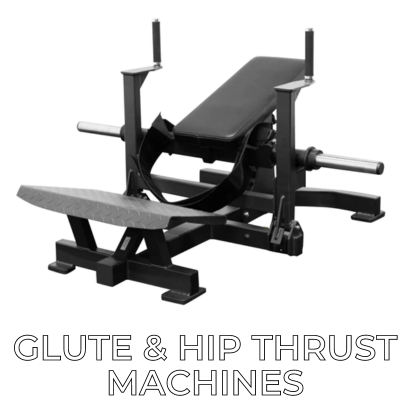| 8am-6pm CST
8am-6pm CST
BodyKore Hip Thrust - FL1844 Are you looking to enhance your fitness routine with effective glute and hip training? Discover the indispensabl...
View full detailsTKO Hip Thrust Machine Designed for durability and user convenience, the TKO Hip Thrust Machine is perfect for anyone dedicated to enhancing their...
View full detailsPlate Loaded Glute Lift Pro by The Abs Company Discover effective glute training with the Glute Lift Pro Glute Trainer by The Abs Company, tail...
View full detailsGlute Lift by The Abs Company - Light Commercial Revolutionize your glute training with the Abs Company Glute Lift, perfect for all fitness leve...
View full detailsSelectorized Glute Lift Elite The Abs Company Dive into one of the hottest trends in fitness with the Glute Lift Elite, a state-of-the-art glute ma...
View full detailsBodyKore CF8131 Hip Thrust Glute Press Achieve unparalleled glute and hip development with the BodyKore CF8131 Hip Press, a new machine designed sp...
View full detailsTKO Strength Signature Glute Kickback 7018-G2 It's compactness and denser padding for enhanced durability and comfort offer precise, focused worko...
View full detailsBodykore GR635 Rotary Hip Machine Tired of the same old hip workouts that fail to target the right muscles effectively? Meet the Bodykore Isol...
View full detailsUnleash Your Glute Potential with the Isolation Series GR618 Selectorized Rear Kick by Bodykore Take Your Glute Training to the Next Level with...
View full detailsGrow Your Glutes with the Stacked Series Rear Kick GR810 by Bodykore Get ready to ignite your glute workouts and elevate your strength with th...
View full detailsWhy the A975 Rear Kick by SportsArt is a Must-Have for Modern Gyms Its intuitive design allows for quick adjustments, minimizing downtime and keep...
View full detailsSteelflex Plate Loaded Glute/Hip Extension Machine PLHE Target your glutes and hips effectively with the Steelflex Plate Loaded Hip Extension ...
View full detailsThe Inflight Fitness CT Series Multi Hip and Glute Machine The Multi hip and glute machine offers a wide variety of lower body exercises ranging fr...
View full detailsTKO Strength Signature Multi Hip 7019-G2 Revolutionize your leg days with the TKO Multi Hip 7019-G2—where every rep transforms your routine into a ...
View full detailsTKO Strength Rear Kick 721RK Elevate your gym with the TKO Strength 721RK Rear Kick and witness your dedication pay off in enhanced strength and mu...
View full detailsBody Solid Powerline Glute Max PGM200X Powerline by Body-Solid is renowned for innovating compact, quality home gyms that combine form and functio...
View full detailsRedefining Glute Training in Modern Gyms with SportsArt P855 Glute Kickback Precisely isolates the maximus, medius, and minimus glute muscles in...
View full detailsMaximize Glute Gains with Precision with the SportsArt N955 Glute Provides targeted lower body strengthening, precise gluteal engagement and vari...
View full detailsRevolutionize Hip Training with the N961 Total Hip by SportsArt Transforms hip training with its adjustable leg pad and precise micro-loading, of...
View full detailsTAG Fitness Elite Total Hip Selectorized Enhance your lower body training with the TAG Fitness Elite Total Hip Machine, tailored to strengthen hips...
View full detailsGlute Coaster TL by the Abs Company Elevate your glute workouts with the Glute Coaster TL, designed to precisely target and shape your glutes. T...
View full detailsThe Abs Company All-New Glute Zone Training System Transform your fitness facility with the GLUTE ZONE, a revolutionary training system from The Ab...
View full detailsThe Ab and Glute Zone™ by The Abs Company (6 pieces) Revitalize your gym with The Ab and Glute Zone™ by The Abs Company, a tailored training pac...
View full detailsThe Abs Company The Ab & Glute Zone 4 Piece Commercial Package - AB-GLUTE-PKG Elevate your core and glute workouts with The Abs Company's Ab &a...
View full details
A Hip Thrust Machine is the tool you need to help you or your members to build a nice pair of glutes (a big booty) and train the hips and core.
We've got options for home or a heavy duty commercial hip thrust machines to attract good looking clients and be that place with the nice glute training equipment! You know what we mean...
Our lineup includes a variety of different types including, plate loaded & selectorized, glute thrust benches, glute kickback machines, and more!
Incorporating the hip thrust into your training regimen, whether its at home or at the gym, allows for isolation and precision targeting of everybody's favorite muscle, the butt.
Shop now to find the best hip thrust machine that not only sculps a more attractive pair of glutes, but provides a solid foundation for your training and in real life! For further assistance or information, feel free to reach out at 888-995-4450 or consult our experts online!
placeholder
